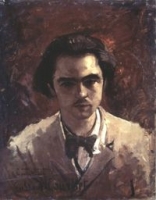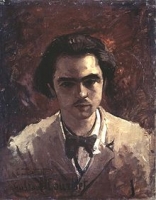阅读wèi 'ěr lún Paul-Marie Veriaine在诗海的作品!!! | |||
wèi 'ěr lún shēng yú fǎ guó dōng bù chéng zhèn méi sī。 tā de fù qīn shì yī gé fǎ guó jūn guān, mǔ qīn zé shì yī gè qián chéng、 fù yòu de nǚ rén。 tā 7 suì shí, jǔ jiā qián wǎng bā lí。 wèi 'ěr lún zǎo nián xué guò fǎ lǜ, zuò guò bǎo xiǎn gōng sī de zhí yuán, tā hěn kuài jiù duì zhè fèn gōng zuò gǎn dào yàn fán, bìng kāi shǐ chén nì yú jiǔ jīng。
1870 nián, jìn guǎn wèi 'ěr lún yòu tóng xìng liàn de qīng xiàng, dàn tā hái shì qǔ liǎo yī gè 16 suì de gū niàn, bìng yù yòu yī zǐ。 tā yī biān huó yuè zài shàng liú shè huì de shā lóng, tóng shí yě rè 'ài bō xī mǐ yà qún tǐ。
wèi 'ěr lún zháomí yú bō dé lāi 'ěr de shī gē, 1866 nián, tā chū bǎn liǎo tā de dì yī běn shī jí。
tā zǎo qī de shī fēng fěng cì 'ér chén sī, lèi sì yú dāng shí de yìn xiàng zhù yì。 tā de shī gē shì rén shēng piàn duàn de suō yǐng: chū wěn、 bèi ké、 jiē tóu jí jǐng。
1871 nián, gé mìng zài bā lí bào fā, wèi 'ěr lún zhī chí bā lí gōng shè, zài jī jìn de lín shí zhèng fǔ zhōng zuò guò shěn chá yuán。 gé mìng shī bài hòu, tā bù zài duì zhèng zhì gǎn xīng qù, chóngxīn chén miǎn yú dù sōng zǐ jiǔ hé kǔ 'ài jiǔ。 1871 nián, wèi 'ěr lún fā xiàn liǎo lán bō de shī gē tiān fù, bìng bù gù yú lùn, fēng kuáng dì 'ài shàng tā。 tā men zài lún dūn hé bù lǔ sài 'ěr guò lái rén liǎng nián de tóng jū shēng huó, zài yī xì liè zhēng zhí hòu, wèi 'ěr lún jiǔ hòu kāi qiāng dǎ shāng liǎo lán bō de shǒu wàn, yīn cǐ rù yù liǎng nián。
1881 nián, wèi 'ěr lún chū bǎn liǎo shī jí《 zhì huì》, xiāo liàng hǎo yú tā yǐ qián de zuò pǐn。
wǎn nián, tā xiàn rù liǎo gèng 'àn dàn de zhù tí, zhěng tiān zài bā lí de kā fēi guǎn kuáng yǐn kǔ 'ài jiǔ, hùn jì yú liǎng gè jì nǚ zhī jiān, huī huò tā de bǎn shuì。
1894 nián, tā chū bǎn liǎo míng wéi《 sǐ hòu shū》 de shī jí, tā de shī gē shì zì zhǐ de, yī gè háo yǐn kǔ 'ài jiǔ de shī rén de xíng xiàng, chéng wéi shī gē de zhù tí。
1896 nián, tā sǐ yú yī gè jì nǚ de jiā zhōng。
Early life
Born in Metz, he was educated at the lycée Bonaparte (now the lycée Condorcet),[1] in Paris and then took up a post in the civil service. He began writing poetry at an early age, and was initially influenced by the Parnassien movement and its leader, Charles Leconte de Lisle. Verlaine's first published collection, Poèmes saturniens (1866),[2] though adversely commented upon by Sainte-Beuve, established him as a poet of promise and originality.
Marriage and military service
Verlaine's private life spills over into his work, beginning with his love for Mathilde Mauté. Mauté became Verlaine's wife in 1870. At the proclamation of the Third Republic in the same year, Verlaine joined the 160th battalion of the Garde nationale, turning Communard on March 18, 1871.
He became head of the press bureau of the Central Committee of the Paris Commune. Verlaine escaped the deadly street fighting known as the Bloody Week, or Semaine Sanglante, and went into hiding in the Pas-de-Calais.
Imprisonment
Verlaine returned to Paris in August 1871, and, in September, he received the first letter from the poet Arthur Rimbaud. By 1872, he had lost interest in Mathilde, and effectively abandoned her and their son, preferring the company of his new lover.[2] Rimbaud and Verlaine's stormy love affair took them to London in 1872. In July 1873 in a drunken, jealous rage, he fired two shots with a pistol at Rimbaud, wounding his left wrist, though not seriously injuring the poet. As an indirect result of this incident, Verlaine was arrested and imprisoned at Mons, where he underwent a conversion to Roman Catholicism, which again influenced his work and provoked Rimbaud's sharp criticism. Romances sans paroles was the poetic outcome of this period.
Following his release from prison, Verlaine again traveled to England, where he worked for some years as a teacher and produced another successful collection, Sagesse. He returned to France in 1877 and, while teaching English at a school in Rethel, became infatuated with one of his pupils, Lucien Létinois, who inspired Verlaine to write further poems. Verlaine was devastated when the boy died of typhus in 1883.
Final years
Verlaine's last years witnessed a descent into drug addiction, alcoholism, and poverty. He lived in slums and public hospitals, and spent his days drinking absinthe in Paris cafes. Fortunately, the French people's love of the arts was able to resurrect support and bring in an income for Verlaine: his early poetry was rediscovered, his lifestyle and strange behavior in front of crowds attracted admiration, and in 1894 he was elected France's "Prince of Poets" by his peers. His poetry was admired and recognized as ground-breaking, serving as a source of inspiration to famous composers, such as Gabriel Fauré, who set many of his poems to music, including La bonne chanson, and Claude Debussy, who set five of the Fêtes galantes poems to music, forming part of the mélodie collection known as the Recueil Vasnier.[3]
Paul Verlaine died in Paris at the age of 51 on January 8, 1896., and was buried in the Cimetière des Batignolles.
Style
Verlaine in a caféMuch of the French poetry produced during the fin de siècle was characterized as "decadent" for its lurid content or moral vision. In a similar vein, Verlaine used the expression poète maudit ("accursed poet") in 1884 to refer to a number of poets like Stéphane Mallarmé and Arthur Rimbaud who had fought against poetic conventions and suffered social rebuke or were ignored by the critics. But with the publication of Jean Moréas' Symbolist Manifesto in 1886, it was the term symbolism which was most often applied to the new literary environment. Along with Verlaine, Mallarmé, Rimbaud, Paul Valéry, Albert Samain and many others began to be referred to as "Symbolists". These poets would often share themes that parallel Schopenhauer's aesthetics and notions of will, fatality and unconscious forces, and used themes of sex (such as prostitutes), the city, irrational phenomena (delirium, dreams, narcotics, alcohol), and sometimes a vaguely medieval setting.
In poetry, the symbolist procedure - as typified by Verlaine - was to use subtle suggestion instead of precise statement (rhetoric was banned) and to evoke moods and feelings through the magic of words and repeated sounds and the cadence of verse (musicality) and metrical innovation.
Portrayals
Rimbaud as drawn by VerlaineNumerous artists painted Verlaine's portrait. Among the most illustrious were Henri Fantin-Latour, Antonio de la Gándara, Eugène Carrière, Frédéric Cazalis, and Théophile-Alexandre Steinlen.
The time Verlaine and Rimbaud spent together was the subject of the 1995 film Total Eclipse, directed by Agnieszka Holland and with a screenplay by Christopher Hampton, based on his play. Verlaine was portrayed by David Thewlis.
Works
Verlaine's Complete Works are available in critical editions from the Bibliothèque de la Pléiade.
Poèmes saturniens (1866)
Les Amies (1867)
Fêtes galantes (1869)
La Bonne chanson (1870)
Romances sans paroles (1874)
Sagesse (1880)
Les Poètes maudits (1884)
Jadis et naguère (1884)
Amour (1888)
Parallèlement (1889)
Dédicaces (1890)
Femmes (1890)
Hombres (1891)
Bonheur (1891)
Mes hôpitaux (1891)
Chansons pour elle (1891)
Liturgies intimes (1892)
Mes prisons (1893)
Élégies (1893)
Odes en son honneur (1893)
Dans les limbes (1894)
Épigrammes (1894)
Confessions (1895)
References
^ Article in Wikipedia français
^ a b Paul Verlaine. Litweb.net. Retrieved on 2007-07-18.
^ Rolf, Marie. Page 7 of liner notes to Forgotten Songs by Claude Debussy, with Dawn Upshaw and James Levine, Sony SK 67190.
Paul Verlaine, Correspondance générale: [Vol.] I, 1857-1885 (edited and annotated by Michael Pakenham). Paris: Fayard, 2005. 16 x 24 cm. 1,122 pages. ISBN 2-213-61950-6

